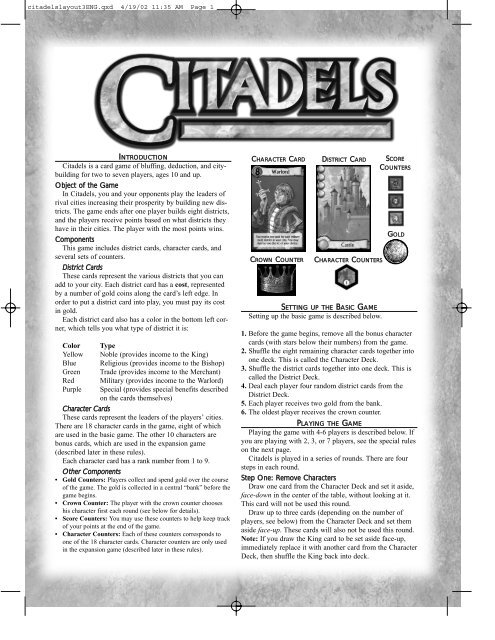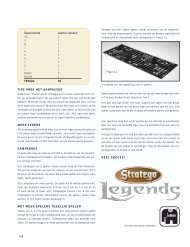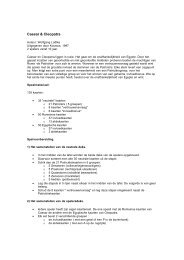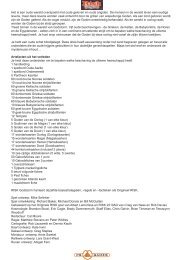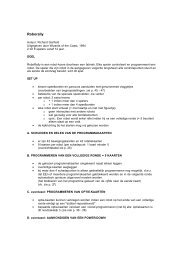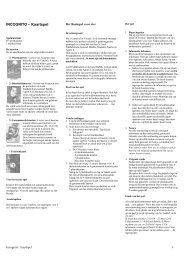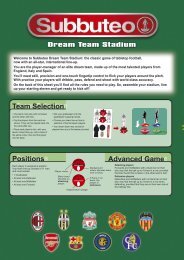Citadels is a card game of bluffing, deduction, and ... - Gamingcorner
Citadels is a card game of bluffing, deduction, and ... - Gamingcorner
Citadels is a card game of bluffing, deduction, and ... - Gamingcorner
Create successful ePaper yourself
Turn your PDF publications into a flip-book with our unique Google optimized e-Paper software.
citadelslayout3ENG.qxd 4/19/02 11:35 AM Page 1<br />
INTRODUCTION<br />
<strong>Citadels</strong> <strong>is</strong> a <strong>card</strong> <strong>game</strong> <strong>of</strong> <strong>bluffing</strong>, <strong>deduction</strong>, <strong>and</strong> citybuilding<br />
for two to seven players, ages 10 <strong>and</strong> up.<br />
Object <strong>of</strong> the Game<br />
In <strong>Citadels</strong>, you <strong>and</strong> your opponents play the leaders <strong>of</strong><br />
rival cities increasing their prosperity by building new d<strong>is</strong>tricts.<br />
The <strong>game</strong> ends after one player builds eight d<strong>is</strong>tricts,<br />
<strong>and</strong> the players receive points based on what d<strong>is</strong>tricts they<br />
have in their cities. The player with the most points wins.<br />
Components<br />
Th<strong>is</strong> <strong>game</strong> includes d<strong>is</strong>trict <strong>card</strong>s, character <strong>card</strong>s, <strong>and</strong><br />
several sets <strong>of</strong> counters.<br />
D<strong>is</strong>trict Cards<br />
These <strong>card</strong>s represent the various d<strong>is</strong>tricts that you can<br />
add to your city. Each d<strong>is</strong>trict <strong>card</strong> has a cost, represented<br />
by a number <strong>of</strong> gold coins along the <strong>card</strong>’s left edge. In<br />
order to put a d<strong>is</strong>trict <strong>card</strong> into play, you must pay its cost<br />
in gold.<br />
Each d<strong>is</strong>trict <strong>card</strong> also has a color in the bottom left corner,<br />
which tells you what type <strong>of</strong> d<strong>is</strong>trict it <strong>is</strong>:<br />
Color Type<br />
Yellow Noble (provides income to the King)<br />
Blue Religious (provides income to the B<strong>is</strong>hop)<br />
Green Trade (provides income to the Merchant)<br />
Red Military (provides income to the Warlord)<br />
Purple Special (provides special benefits described<br />
on the <strong>card</strong>s themselves)<br />
Character Cards<br />
These <strong>card</strong>s represent the leaders <strong>of</strong> the players’ cities.<br />
There are 18 character <strong>card</strong>s in the <strong>game</strong>, eight <strong>of</strong> which<br />
are used in the basic <strong>game</strong>. The other 10 characters are<br />
bonus <strong>card</strong>s, which are used in the expansion <strong>game</strong><br />
(described later in these rules).<br />
Each character <strong>card</strong> has a rank number from 1 to 9.<br />
Other Components<br />
• Gold Counters: Players collect <strong>and</strong> spend gold over the course<br />
<strong>of</strong> the <strong>game</strong>. The gold <strong>is</strong> collected in a central “bank” before the<br />
<strong>game</strong> begins.<br />
• Crown Counter: The player with the crown counter chooses<br />
h<strong>is</strong> character first each round (see below for details).<br />
• Score Counters: You may use these counters to help keep track<br />
<strong>of</strong> your points at the end <strong>of</strong> the <strong>game</strong>.<br />
• Character Counters: Each <strong>of</strong> these counters corresponds to<br />
one <strong>of</strong> the 18 character <strong>card</strong>s. Character counters are only used<br />
in the expansion <strong>game</strong> (described later in these rules).<br />
CHARACTER CARD<br />
CROWN COUNTER<br />
DISTRICT CARD<br />
CHARACTER COUNTERS<br />
SETTING UP THE BASIC GAME<br />
Setting up the basic <strong>game</strong> <strong>is</strong> described below.<br />
SCORE<br />
COUNTERS<br />
GOLD<br />
1. Before the <strong>game</strong> begins, remove all the bonus character<br />
<strong>card</strong>s (with stars below their numbers) from the <strong>game</strong>.<br />
2. Shuffle the eight remaining character <strong>card</strong>s together into<br />
one deck. Th<strong>is</strong> <strong>is</strong> called the Character Deck.<br />
3. Shuffle the d<strong>is</strong>trict <strong>card</strong>s together into one deck. Th<strong>is</strong> <strong>is</strong><br />
called the D<strong>is</strong>trict Deck.<br />
4. Deal each player four r<strong>and</strong>om d<strong>is</strong>trict <strong>card</strong>s from the<br />
D<strong>is</strong>trict Deck.<br />
5. Each player receives two gold from the bank.<br />
6. The oldest player receives the crown counter.<br />
PLAYING THE GAME<br />
Playing the <strong>game</strong> with 4-6 players <strong>is</strong> described below. If<br />
you are playing with 2, 3, or 7 players, see the special rules<br />
on the next page.<br />
<strong>Citadels</strong> <strong>is</strong> played in a series <strong>of</strong> rounds. There are four<br />
steps in each round.<br />
Step One: Remove Characters<br />
Draw one <strong>card</strong> from the Character Deck <strong>and</strong> set it aside,<br />
face-down in the center <strong>of</strong> the table, without looking at it.<br />
Th<strong>is</strong> <strong>card</strong> will not be used th<strong>is</strong> round.<br />
Draw up to three <strong>card</strong>s (depending on the number <strong>of</strong><br />
players, see below) from the Character Deck <strong>and</strong> set them<br />
aside face-up. These <strong>card</strong>s will also not be used th<strong>is</strong> round.<br />
Note: If you draw the King <strong>card</strong> to be set aside face-up,<br />
immediately replace it with another <strong>card</strong> from the Character<br />
Deck, then shuffle the King back into deck.
citadelslayout3ENG.qxd 4/19/02 11:35 AM Page 2<br />
No. <strong>of</strong> Players No. <strong>of</strong> Face-up Cards<br />
4 2<br />
5 1<br />
6-7 0<br />
Step Two: Choose Characters<br />
The player who has the crown takes the Character Deck<br />
<strong>and</strong> secretly chooses a character. He then passes the<br />
remaining character <strong>card</strong>s to the player on h<strong>is</strong> left, who also<br />
chooses a <strong>card</strong>, <strong>and</strong> passes the remaining <strong>card</strong>s to the left.<br />
Th<strong>is</strong> continues until each player has chosen one <strong>card</strong> from<br />
the Character Deck. The last player chooses from the two<br />
remaining <strong>card</strong>s, <strong>and</strong> places the last <strong>card</strong> face-down in the<br />
center <strong>of</strong> the table.<br />
Step Three: Player Turns<br />
Once all the character <strong>card</strong>s are passed out, the player<br />
who has the crown calls out the names <strong>of</strong> each <strong>of</strong> the characters,<br />
in the order <strong>of</strong> their rank numbers. (He first calls out<br />
“Assassin” (#1), then “Thief” (#2), <strong>and</strong> so on.) If none <strong>of</strong><br />
the players has a given character, the player with the crown<br />
moves onto the next character.<br />
When the name <strong>of</strong> your character <strong>card</strong> <strong>is</strong> called, you<br />
must reveal your character <strong>card</strong>, place it face-up in front <strong>of</strong><br />
you, <strong>and</strong> take your turn. When your turn <strong>is</strong> over, the player<br />
with the crown calls the name <strong>of</strong> the next character <strong>card</strong>. In<br />
th<strong>is</strong> manner, play proceeds in the order <strong>of</strong> the character<br />
<strong>card</strong>s.<br />
On Your Turn<br />
On your turn, you must first take an action, then you<br />
may build a d<strong>is</strong>trict <strong>card</strong>.<br />
1) Take an Action: At the beginning <strong>of</strong> your turn, you<br />
must either<br />
• take two gold from the bank,<br />
• or draw two d<strong>is</strong>trict <strong>card</strong>s from the D<strong>is</strong>trict Deck,<br />
choose one to put in your h<strong>and</strong>, <strong>and</strong> put the other on<br />
the bottom <strong>of</strong> the deck.<br />
2) Build a D<strong>is</strong>trict Card: You may build one d<strong>is</strong>trict<br />
<strong>card</strong> into your city (that <strong>is</strong>, play it from your h<strong>and</strong> onto the<br />
table in front <strong>of</strong> you). In order to do so, you must pay the<br />
cost <strong>of</strong> the d<strong>is</strong>trict, in gold, to the bank. You may choose<br />
not to build a d<strong>is</strong>trict <strong>card</strong> if you w<strong>is</strong>h.<br />
You may never have two identical d<strong>is</strong>tricts (two castles,<br />
two markets, etc.) in your city.<br />
Each character also has a power. You may use your character’s<br />
power once during your turn. (The powers <strong>of</strong> each<br />
character are summarized on their <strong>card</strong>s <strong>and</strong> detailed at the<br />
end <strong>of</strong> these rules. Be sure to familiarize yourself with the<br />
detailed powers before playing.)<br />
Step Four: End <strong>of</strong> Round<br />
After all the characters have been called, the players<br />
return their <strong>card</strong>s to the Character Deck, which <strong>is</strong> shuffled,<br />
<strong>and</strong> a new round begins.<br />
GAME END<br />
When a player builds an eighth d<strong>is</strong>trict, the players fin<strong>is</strong>h<br />
the round. The <strong>game</strong> ends at the end <strong>of</strong> that round. At the<br />
end <strong>of</strong> the <strong>game</strong>, each player receives points as follows.<br />
(You can use the scoring counters to help keep track <strong>of</strong> how<br />
many points you receive.)<br />
• Points equal to the total costs <strong>of</strong> all the d<strong>is</strong>tricts in a<br />
player’s city<br />
• + 3 points if a player has d<strong>is</strong>tricts <strong>of</strong> each <strong>of</strong> the five<br />
colors<br />
• +4 for the first player to build eight d<strong>is</strong>tricts<br />
• +2 for each subsequent player to build eight d<strong>is</strong>tricts<br />
OTHER RULES<br />
Two- or Three-player Game<br />
In a two- or three-player <strong>game</strong>, both players play with<br />
two characters apiece. The <strong>game</strong> <strong>is</strong> played normally, except<br />
that each player plays twice each round (once for each<br />
character). Players do not have to seperate their gold or<br />
their d<strong>is</strong>tricts between their characters, as they still only<br />
have one city. A player can, for example, keep the money<br />
earned by h<strong>is</strong> first character to build an expensive d<strong>is</strong>trict<br />
with h<strong>is</strong> second character.<br />
If you are playing with two or three players, skip the first<br />
two steps <strong>of</strong> the round (“Remove Characters” <strong>and</strong> “Choose<br />
Characters”) <strong>and</strong> follow the following instructions instead:<br />
Two-player Game<br />
1. The player who has the crown (Player A) takes the<br />
Character Deck, d<strong>is</strong><strong>card</strong>s the top <strong>card</strong> face-down in the<br />
center <strong>of</strong> the table without looking at it, <strong>and</strong> secretly<br />
chooses a character for himself. He then passes the<br />
remaining six character <strong>card</strong>s to the other player (Player<br />
B).<br />
2. Player B chooses one <strong>card</strong> from the Character Deck for<br />
himself, <strong>and</strong> chooses another to d<strong>is</strong><strong>card</strong> face-down in the<br />
center <strong>of</strong> the table. He then passes the remaining four<br />
<strong>card</strong>s to Player A.<br />
3. Player A takes one <strong>of</strong> the four <strong>card</strong>s into h<strong>is</strong> h<strong>and</strong>, places<br />
one more <strong>card</strong> face-down at the center <strong>of</strong> the table, <strong>and</strong><br />
passes the last two <strong>card</strong>s to Player B.<br />
4. Player B takes one <strong>card</strong> <strong>and</strong> places the last <strong>card</strong> facedown<br />
at the center <strong>of</strong> the table.<br />
Three-Player Game<br />
The player who has the crown takes the Character Deck,<br />
d<strong>is</strong><strong>card</strong>s the top <strong>card</strong> face-down in the center <strong>of</strong> the table<br />
without looking at it, <strong>and</strong> secretly chooses a character for<br />
himself.<br />
He then passes the remaining character <strong>card</strong>s to the player<br />
on h<strong>is</strong> left, who also chooses a <strong>card</strong>, <strong>and</strong> passes the<br />
remaining <strong>card</strong>s to the left.<br />
Th<strong>is</strong> continues until each player has chosen two <strong>card</strong>s<br />
from the Character Deck. The last player chooses from the<br />
two remaining <strong>card</strong>s, <strong>and</strong> places the last <strong>card</strong> face-down in<br />
the center <strong>of</strong> the table.<br />
Seven-player Game<br />
During the “Choose Characters” step <strong>of</strong> a seven-player<br />
<strong>game</strong>, when the seventh player gets one character <strong>card</strong> from<br />
the sixth player, he also takes the face-down d<strong>is</strong><strong>card</strong>ed <strong>card</strong>.<br />
He then chooses one <strong>of</strong> these two <strong>card</strong>s <strong>and</strong> d<strong>is</strong><strong>card</strong>s the<br />
other one, face-down.
citadelslayout3ENG.qxd 4/19/02 11:35 AM Page 3<br />
Variant: Shorter Game<br />
The <strong>game</strong> ends when a player has seven d<strong>is</strong>tricts, not<br />
eight.<br />
EXPANSION GAME<br />
Th<strong>is</strong> <strong>game</strong> also includes 10 extra character <strong>card</strong>s (each<br />
marked with a star) which you can add to your <strong>Citadels</strong><br />
<strong>game</strong> for more fun <strong>and</strong> variety. You may include these<br />
bonus characters in one <strong>of</strong> two ways:<br />
1. Before the <strong>game</strong>, the players agree to remove one or two<br />
<strong>of</strong> the original character <strong>card</strong>s <strong>and</strong> replace them with<br />
expansion characters <strong>of</strong> the same rank numbers. For<br />
example, you may agree to remove the Merchant (#6)<br />
<strong>and</strong> replace him with the Alchem<strong>is</strong>t (#6).<br />
2. If you use one <strong>of</strong> the #9 characters, you can play with<br />
eight players. When playing with eight players, d<strong>is</strong><strong>card</strong><br />
no face-up character <strong>card</strong>s <strong>and</strong> use the seven-player rules<br />
l<strong>is</strong>ted above.<br />
CHARACTER POWERS<br />
Each character has a power. You may use your character’s power once during your turn. Each character’s power <strong>is</strong> summarized<br />
on its <strong>card</strong>, but <strong>is</strong> detailed in the l<strong>is</strong>t below.<br />
Note: Characters who receive income for having certain types <strong>of</strong> d<strong>is</strong>tricts in their cities (the King, Emperor, B<strong>is</strong>hop,<br />
Abbot, Merchant, Diplomat, <strong>and</strong> Warlord) may receive the extra gold at any time. You may receive your income either<br />
before building new d<strong>is</strong>tricts (if you need the gold in order to build the d<strong>is</strong>tricts), or after building new d<strong>is</strong>tricts (if the<br />
newlybuilt d<strong>is</strong>tricts give you income). All income must be received at once, however. If you receive income at the beginning<br />
<strong>of</strong> your turn, you cannot receive additional income from any d<strong>is</strong>tricts you build during your turn.<br />
Basic Characters<br />
Announce a character you<br />
(1) Assassin<br />
w<strong>is</strong>h to murder. The player<br />
who has the murdered character says nothing,<br />
<strong>and</strong> says nothing when the character <strong>is</strong> called to<br />
take h<strong>is</strong> turn. The murdered character m<strong>is</strong>ses h<strong>is</strong> entire turn.<br />
Announce a character<br />
(2) Thief<br />
from whom you w<strong>is</strong>h to<br />
steal. When the player who has th<strong>is</strong> character <strong>is</strong><br />
called upon <strong>and</strong> shows h<strong>is</strong> character <strong>card</strong>, you take<br />
all <strong>of</strong> h<strong>is</strong> gold. You may not steal from the Assassin or the<br />
character that the Assassin murdered.<br />
(3) Magician At any time during your<br />
turn, you may do one <strong>of</strong><br />
the following two things:<br />
• Exchange your entire h<strong>and</strong> <strong>of</strong> <strong>card</strong>s (not the <strong>card</strong>s in your<br />
city) with the h<strong>and</strong> <strong>of</strong> another player. Th<strong>is</strong> applies even if<br />
you have no <strong>card</strong>s in your h<strong>and</strong>, in which case you simply<br />
take the other player’s <strong>card</strong>s.<br />
• D<strong>is</strong><strong>card</strong> any number <strong>of</strong> <strong>card</strong>s from your h<strong>and</strong> to the bottom<br />
<strong>of</strong> the D<strong>is</strong>trict Deck, then draw an equal number <strong>of</strong> <strong>card</strong>s<br />
from the top <strong>of</strong> the D<strong>is</strong>trict Deck.<br />
If you decide to use one <strong>of</strong> the #9 characters in a four- to<br />
seven-player <strong>game</strong>, you must d<strong>is</strong><strong>card</strong> a number <strong>of</strong> <strong>card</strong>s<br />
face-up at the beginning <strong>of</strong> each round, as detailed<br />
below:<br />
No. <strong>of</strong> Players No. <strong>of</strong> Face-up Cards<br />
4 3<br />
5 2<br />
6 1<br />
7 0<br />
Character Counters<br />
If you are playing the expansion <strong>game</strong>, you may w<strong>is</strong>h to<br />
use the character counters to help you remember which<br />
characters you are using in th<strong>is</strong> <strong>game</strong>. Before the <strong>game</strong><br />
begins, when you determine which characters you will use<br />
in the <strong>game</strong>, put those characters’ counters in the middle <strong>of</strong><br />
the table to serve as a reminder <strong>of</strong> which characters are<br />
being used.<br />
You receive one gold for<br />
(4) King each noble (yellow) d<strong>is</strong>trict<br />
in your city. When<br />
the King <strong>is</strong> called, you immediately receive the<br />
crown counter. You will now call for characters, <strong>and</strong> will be<br />
the first player to choose your character during the next<br />
round. If no King <strong>is</strong> chosen during the next round, you will<br />
keep the crown counter. If you are murdered, you skip your<br />
turn like any other character. Nevertheless, after the last<br />
player has played h<strong>is</strong> turn, when it becomes known that you<br />
had the King character, you take the crown counter (as the<br />
king's heir) <strong>and</strong> you choose your character first on the next<br />
round.<br />
(5) B<strong>is</strong>hop You receive one gold for<br />
each religious (blue) d<strong>is</strong>trict<br />
in your city. Your d<strong>is</strong>tricts may not be<br />
destroyed by the Warlord.<br />
(6) Merchant You receive one gold for<br />
each trade (green) d<strong>is</strong>trict<br />
in your city. After you take an action, you receive<br />
one extra gold. Therefore, you can either receive<br />
three gold, or draw a <strong>card</strong> <strong>and</strong> receive one gold.
citadelslayout3ENG.qxd 4/19/02 11:35 AM Page 4<br />
After you take an action,<br />
(7) Architect you draw two extra d<strong>is</strong>trict<br />
<strong>card</strong>s <strong>and</strong> put both in<br />
your h<strong>and</strong>. You may build up to three d<strong>is</strong>tricts during<br />
your turn.<br />
You receive one gold for<br />
(8) Warlord<br />
each military (red) d<strong>is</strong>trict<br />
in your city. At the end <strong>of</strong> your turn, you may<br />
destroy one d<strong>is</strong>trict <strong>of</strong> your choice by paying a<br />
number <strong>of</strong> gold equal to one less than the cost <strong>of</strong> the d<strong>is</strong>trict.<br />
Thus, you may destroy a cost 1 d<strong>is</strong>trict for free, a cost 2 d<strong>is</strong>trict<br />
for 1 gold, or a cost 5 d<strong>is</strong>trict for 4 gold. You may<br />
destroy one <strong>of</strong> your own d<strong>is</strong>tricts. You may not, however,<br />
destroy a d<strong>is</strong>trict in a city that <strong>is</strong> already completed by having<br />
eight d<strong>is</strong>tricts.<br />
Expansion Characters<br />
After you take an action,<br />
(1) Witch<br />
you announce which<br />
character you w<strong>is</strong>h to bewitch, then immediately<br />
end your turn. When the player who has the<br />
bewitched character <strong>is</strong> called upon, he shows h<strong>is</strong> character<br />
<strong>card</strong> <strong>and</strong> takes an action, then immediately ends h<strong>is</strong> turn.<br />
You now resume th<strong>is</strong> player’s turn as if you were playing<br />
the bewitched character, using all that character’s powers<br />
(including the one gold bonus <strong>of</strong> the Merchant or the two<br />
<strong>card</strong> bonus <strong>of</strong> the Architect) in your city. If the King <strong>is</strong><br />
bewitched, the King player still receives the crown counter.<br />
If no one has the bewitched character, you do not resume<br />
your turn. The Thief cannot steal from the Witch or the<br />
character that the Witch bewitched.<br />
If a player builds one or<br />
(2)Tax Collector<br />
more d<strong>is</strong>tricts in h<strong>is</strong> city,<br />
that player must, at the end <strong>of</strong> h<strong>is</strong> turn, give you<br />
one gold (if he has any gold left). If the Assassin or<br />
Witch has already built a d<strong>is</strong>trict <strong>card</strong>, <strong>and</strong> has any money<br />
left, that player must also pay you a gold as soon as you<br />
reveal that you have the Tax Collector.<br />
You may look at another<br />
(3) Wizard player’s h<strong>and</strong> <strong>of</strong> <strong>card</strong>s<br />
<strong>and</strong> take one <strong>card</strong>. You may then either put th<strong>is</strong><br />
<strong>card</strong> into your h<strong>and</strong>, or pay to build it into your<br />
city. If you build it into your city, it does not count as your<br />
one d<strong>is</strong>trict th<strong>is</strong> turn, which means you can build another<br />
d<strong>is</strong>trict as well. You may build a d<strong>is</strong>trict identical to a d<strong>is</strong>trict<br />
already in your city.<br />
You receive one gold for<br />
(4) Emperor each noble (yellow) d<strong>is</strong>trict<br />
in your city. When the Emperor <strong>is</strong> called, you<br />
immediately take the crown counter from the player<br />
who has it <strong>and</strong> give it to a different player (but not yourself).<br />
The player who receives the crown counter must give<br />
you one gold or one d<strong>is</strong>trict <strong>card</strong> from h<strong>is</strong> h<strong>and</strong>. If the player<br />
has neither a gold nor a <strong>card</strong>, he does not have to give you<br />
anything. (Note that, like the King, the Emperor may not be<br />
in the face-up d<strong>is</strong><strong>card</strong>ed character <strong>card</strong>s.)<br />
You receive one gold for<br />
(5) Abbot each religious (blue) d<strong>is</strong>trict<br />
in your city. The<br />
player who has the most gold must pay you one<br />
gold. If there <strong>is</strong> a tie for the player with the most gold,<br />
or if you have the most gold, then no one pays you.<br />
You get back all the gold<br />
(6) Alchem<strong>is</strong>t you spend to build d<strong>is</strong>trict<br />
<strong>card</strong>s, but not the gold you spend for other<br />
reasons (paying the Tax Collector, for example).<br />
You cannot spend more gold than you have during your<br />
turn.<br />
After taking an action,<br />
(7) Navigator<br />
you receive four gold or<br />
draw four <strong>card</strong>s. You may not build any d<strong>is</strong>trict<br />
<strong>card</strong>s.<br />
You receive one gold for<br />
(8) Diplomat<br />
each military (red) d<strong>is</strong>trict<br />
in your city. At the end <strong>of</strong> your turn, you<br />
may take a d<strong>is</strong>trict from another player’s city in<br />
exchange for a d<strong>is</strong>trict in your city. If the d<strong>is</strong>trict you take<br />
has a higher cost than the d<strong>is</strong>trict you give, you must pay the<br />
difference in gold to the player with whom you make the<br />
exchange. (The Great Wall affects th<strong>is</strong> cost.) You may not<br />
take the Keep d<strong>is</strong>trict, or any d<strong>is</strong>tricts in the B<strong>is</strong>hop’s city.<br />
Note: If you are using the Diplomat in your <strong>game</strong>, you must<br />
remove the Cemetery from the deck, as it will not be used.<br />
You may “beautify” one<br />
(9) Art<strong>is</strong>t<br />
or two <strong>of</strong> your d<strong>is</strong>tricts<br />
by putting your gold on one or both <strong>of</strong> them. The<br />
cost <strong>of</strong> a beautified d<strong>is</strong>trict (<strong>and</strong> therefore the cost<br />
<strong>of</strong> destroying or exchanging it) <strong>is</strong> increased by one. Note<br />
that th<strong>is</strong> increases how many points you receive for the d<strong>is</strong>trict<br />
at the end <strong>of</strong> the <strong>game</strong>. There can be only one gold on<br />
any one d<strong>is</strong>trict.<br />
You receive three gold if<br />
(9) Queen you are sitting beside the<br />
King. If the King has been murdered, but was sitting<br />
beside you, you receive three gold when th<strong>is</strong><br />
becomes known (that <strong>is</strong>, immediately after your turn). Note:<br />
You may not use the Queen in a <strong>game</strong> with fewer than five<br />
players.<br />
Design: Bruno Faidutti<br />
Illustration: Julien Delval, Florence Magnin, Jean-Lou<strong>is</strong> Mourier, Jesper Ejsing, Bjarne Hansen<br />
Graphic Design: Cyrille Daujean, Brian Schomburg<br />
Editing: Darrell Hardy, Chr<strong>is</strong>tian T. Petersen<br />
Translations: Michael Bergström, Tom Aukner, Anders Petersen<br />
Bruno Faidutti’s Credits: Thanks to all who helped me test <strong>and</strong> tune th<strong>is</strong> <strong>game</strong>, specifically Nadine Bernard, Maud B<strong>is</strong>sonnet,<br />
Scarlett Bocchi, Frank Branham, David Calvo, Brent & Maryann Carter, Fabienne Cazal<strong>is</strong>, Pitt Cr<strong>and</strong>lemire, Isabelle<br />
Duvaux, Thierry Fau, Philippe Keyaerts, David Kuznik, Serge Laget, Myriam Lemaire, Pierre Lemoigne, Tr<strong>is</strong>tan Lhomme,<br />
Hervé Marly, Bernard Mendiburu, Hélène Michaux, Steffan O'Sullivan, Philippe des Pallières, Jean-Marc Pauty, Pierre<br />
Rosenthal, Fred Savart, Mik Svellov, <strong>and</strong> Irène Villa (I name only the most assiduous, constructive players, <strong>and</strong> the prettiest<br />
girls). Thanks to all the attendants at my Vth Ludopathic Gathering <strong>and</strong> at Alan Moon's Xth Gathering <strong>of</strong> friends. Thanks to<br />
Marcel-André Casasola-Merkle, since one <strong>of</strong> the core systems <strong>of</strong> <strong>Citadels</strong> comes directly from h<strong>is</strong> <strong>game</strong> Verraeter. Thanks to<br />
Ron Magin, Bernd Brunnh<strong>of</strong>er, Dirk Geilenkeuser <strong>and</strong> Volker Weitzel. Thanks to all those who took part in the Ohne Furcht<br />
und Adel character contest held by Hans im Glueck, <strong>and</strong> specifically to Ben Baldanza, Peter Küsters, Gary Wong, Andrea<br />
Navratil, Chr<strong>is</strong>toph Heinzl, Stefanie Kethers, Alex<strong>and</strong>er Klein, Jonathan Degann, Holger Traczynski <strong>and</strong> Holger<br />
Baumgartner, whose ideas inspired some <strong>of</strong> the new expansion characters. Thanks to Chr<strong>is</strong> Petersen, <strong>of</strong> Fantasy Flight<br />
Games, who was very patient with all the troubles with th<strong>is</strong> Engl<strong>is</strong>h language version. Most <strong>of</strong> all, thanks to Cyrille Daujean,<br />
whose help with designing, testing <strong>and</strong> supporting th<strong>is</strong> <strong>game</strong> was invaluable.


